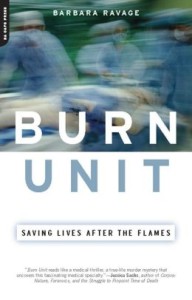Burn Unit by Barbara Ravage
Written by Ashley Kelmore, Posted in Reviews
Five Stars
My first five-star book of 2015! I was a little worried about picking up a long, dense, science non-fiction book after so much young adult reading the past week or so. But this book was fantastic. I found it at Powell’s in the health and medical section and I’m just so glad I did.
Ms. Ravage does a really excellent job of describing what really goes on when someone is burned. I imagine that when most of us think about a burn injury, we picture a sunburn, or a blister on an arm that bumped up against the oven when pulling out a tray of cookies. Some of us might think about tragic events like the Rhode Island nightclub fire, or perhaps people who have jumped from burning buildings. But how many of us really know what goes on when someone is seriously burned? It’s likely that if you or a close loved one hasn’t experienced it, you don’t know much about it.
This book focuses on the burn unit at Massachusetts General Hospital in Boston, which is unique in some ways. For example, they don’t use water tanks for debridement (the cleaning and scraping of wounds), whereas most other units across the country do. But the unit is an amazing, close-knit community of nurses, burn techs, doctors, psychiatrists and others offering support for those who are burned and their family members.
I knew a little bit about burns – that they can leave scars, that large wounds need to be cleaned and that it is excruciating. But I didn’t really know about the physiology of burns. Like the fact that the first week isn’t actually the worst; many can survive the first days but then die from the injuries. The impact on the respiratory system is can be huge if smoke or other chemicals are inhaled; the burns themselves trigger all sorts of haywire reactions, like the rushing of fluid to the site (causing major swelling), and metabolism that can start eating through lean muscle. The book also described what shock actually is which, frankly, I didn’t really understand until now.
Through all of this, Ms. Ravage is telling two stories: one of Dan O’Shea (not his name) and one of Mike Parent. Dan was burned while passed out after a night of drinking and was kept sedated for a couple of months; Mike was injured when a pot caught fire, creating burns on his arms. Their stories are interesting and provide a way to apply the knowledge Ms. Ravage is imparting to real people.
If you have any interest in medicine, or in quality science writing, I just cannot recommend this book enough.

